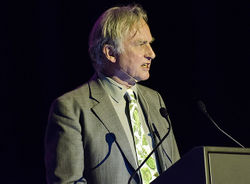Agnosticism And Cowardice
 From Conservapedia
From Conservapedia Res Stecker wrote about agnosticism and cowardice at The Collegian:
| “ | Agnosticism in the religious context according to William Rowe is basically that human reason is incapable of knowing if a religious deity does or does not exist. Essentially, these people are fence sitters, unwilling or incapable of making an important life decision. Richard Dawkins agrees, stating that permanent agnosticism is “intellectual cowardice.” Basically, agnostics are the Switzerland of the (non)theistic world.
It is extremely important to know where you stand on very key issues, things that are central to the identity of human existence. While a temporary position of doubt of a deity would hopefully lead to a full time position in the permanent disbelief department, going in the other direction is also more preferable to stagnant unemployment. Blaise Pascal argued that even if there were no proof of God, it is better for an individual in the long run to believe in him, just in case. Essentially, the expected value of God is greater than just living a life in denial. Thus if you are strictly looking at the odds, Pascal suggests one takes the theistic route. ...a common theme or problem with agnosticism: that people are forced to keep up what has become a charade for fear of dislike by others. [John F.] Kennedy would likely never have been elected had he said “I am an agnostic.” Thus, it appears that a choice of agnosticism is more about pleasing others than knowing oneself. This is the main problem of this position; it forces people to live life as a lie. If they would choose one side or the other, they could drop all the silliness of feigning belief.[1] |
” |
Contents
Views on agnosticism and cowardice[edit]
Both theists and atheists frequently accuse agnostics of being cowardly, due to their wishy-washy rejection of God.[2] Studs Terkel, a self-described agnostic, jokingly referred to the frequent charge of agnostics being called cowardly, "You happen to be talking to an agnostic. You know what an agnostic is? A cowardly atheist".[3]
It is also said by particular Christian groups, particularly but not exclusively in the United States of America, that those who know of Jesus but do not accept Him are just as damned as those who reject Him explicitly.
Agnostic Richard Dawkins and accusations of cowardice[edit]

See also: Agnosticism and debate
The evolutionists Richard Dawkins is an agnostic who flip-flops his public persona between being an agnostic and being an atheist (See: Richard Dawkins and agnosticism).
The Oxford University Professor Daniel Came (an atheist) wrote to Richard Dawkins: "The absence of a debate with the foremost apologist for Christian theism is a glaring omission on your CV and is of course apt to be interpreted as cowardice on your part."[5]
In October 2011, William Lane Craig went to England and the Daily Telegraph declared that Dawkins is either a fool or a coward for his refusal to debate William Lane Craig plus declared that Dawkins is a "proud man" and a "coward" who puts on an "illiterate, angry schtick" for the public.[6] In addition, Christian apologist Ken Ammi called Dawkins a "cowardly clown" because Dawkins and other prominent atheists refused to debate Creation Ministries International at the 2010 Global Atheist Convention.[7]

Below are some resources relating to Dawkins refusal to debate various debate opponents:
- Richard Dawkins and Rabbi Shmuley Boteach (Denied debating him after losing video taped debate, refuses to debate another time)
In addition, respected biochemist and intelligent design researcher Dr Michael Behe has openly challenged prominent evolutionists and proponents of Darwinism to debate him regarding the many failings of evolutionism, yet Richard Dawkins - one of the most outspoken Darwinists today - has declined all such invitations.
See also[edit]
References[edit]
- ↑ Agnosticism is far worse than atheism by Res Stecker
- ↑ Studs Terkel, a self-described agnostic, jokingly referred to the frequent charge of agnostics being called cowardly, "You happen to be talking to an agnostic. You know what an agnostic is? A cowardly atheist".[1]
- ↑ Interview:Studs Terkel, PBS
- ↑ Richard Dawkins accused of cowardice for refusing to debate existence of God, The Daily Telegraph, May 14, 2011
- ↑ Richard Dawkins accused of cowardice for refusing to debate existence of God, The Daily Telegraph, May 14, 2011
- ↑ Richard Dawkins is either a fool or a coward for refusing to debate William Lane Craig - October 21, 2011 - The Daily Telegraph
- ↑ Richard Dawkins, the Cowardly Clown
Categories: [Agnosticism]
↧ Download as ZWI file | Last modified: 02/17/2023 13:47:25 | 55 views
☰ Source: https://www.conservapedia.com/Agnosticism_and_cowardice | License: CC BY-SA 3.0
 ZWI signed:
ZWI signed: KSF
KSF